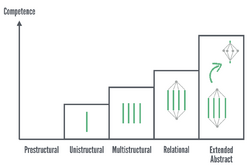Social:Structure of observed learning outcome
From HandWiki
Revision as of 17:51, 4 May 2022 by imported>John Stpola (correction)
Short description: Model of levels of increasing complexity in understanding
The structure of observed learning outcomes (SOLO) taxonomy is a model that describes levels of increasing complexity in students' understanding of subjects. It was proposed by John B. Biggs and Kevin F. Collis.[1]
The model consists of five levels of understanding:[2]
- Pre-structural – The task is not attacked appropriately; the student hasn’t really understood the point and uses too simple a way of going about it. Students in the pre-structural stage of understanding usually respond to questions with irrelevant comments.
- Uni-structural – The student's response only focuses on one relevant aspect. Students in the uni-structural stage of understanding usually give slightly relevant but vague answers that lack depth.
- Multi-structural – The student's response focuses on several relevant aspects but they are treated independently and additively. Assessment of this level is primarily quantitative. Students in the multi-structural stage may know the concept in tidbits but don’t know how to present or explain it.
- Relational – The different aspects have become integrated into a coherent whole. This level is what is normally meant by an adequate understanding of some topic. At the relational stage, students can identify various patterns & view a topic from distinct perspectives.
- Extended abstract – The previous integrated whole may be conceptualised at a higher level of abstraction and generalised to a new topic or area. At this stage, students may apply the classroom concepts in real life.
See also
- Social:Bloom's taxonomy
- DIKW pyramid – Data, information, knowledge, wisdom hierarchy
- Social:Educational psychology – Branch of psychology concerned with the scientific study of human learning
- Engineering:Educational technology – Use of technology in education to improve learning and teaching
- Philosophy:Higher-order thinking – Concept in education and education reform
- Model of hierarchical complexity – Framework for scoring how complex a behavior is
References
- ↑ Biggs, John B.; Collis, Kevin F. (1982). Evaluating the quality of learning: the SOLO taxonomy (structure of the observed learning outcome). Educational psychology series. New York: Academic Press. ISBN 0120975505. OCLC 7813155.
- ↑ Biggs, John B.; Tang, Catherine So-kum (2011) [1999]. Teaching for quality learning at university: what the student does (4th ed.). Maidenhead: McGraw-Hill; Society for Research into Higher Education; Open University Press. ISBN 9780335242757. OCLC 767560793.
External links


